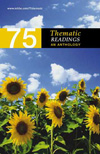
Niccolò Machiavelli |  |
Niccolò MachiavelliMachiavelli, "The Qualities of a Prince" Niccolò Machiavelli (1469-1527) was born in Florence and studied
Roman law. He was a public servant, diplomat, historian, writer, and one
of the most important political scientists of all time. Besides his works
on politics: The Discourses (1531), The Art of War (1519-1520),
and The Prince (1532), Machiavelli also wrote comedies such as
The Mandrake Root (1518) and histories such as his History of
Florence (1595). Machiavelli's entire body of work was put on the
Roman Catholic Church's Index of Prohibited Books in 1559. While today
The Prince is sometimes called "a handbook for dictators,"
Machiavelli strongly believed in supremacy of a republican government.
In this essay, Machiavelli describes the lengths he thinks a leader must
be willing to go to in order to keep that type of government in control.
"The Qualities of a Prince" is an excerpt from his masterpiece,
The Prince. | QUESTIONS FOR DISCUSSION | CONTENT - What kind of spending harms a prince?
- How would you characterize Cesare Borgia?
- What two fears must a prince have?
- According to the author, what is the relationship of cruelty to
mercy?
- Under which circumstances does the author say it's all right for
a prince to lie?
- According to Machiavelli, is it better for a leader to be loved
or to be feared? Why is this the case?
- Discuss the precautions a prince can take against conspiracies.
STRATEGY AND STYLE - This piece was written about 500 years ago. Review your reading
to find some words, phrases, and references that gave you trouble due
to this time difference. If you already haven't done so, look up the
difficult ones. How might you bridge this gap in time and learning in
the future?
- This essay is divided into sections with titles. How can you categorize
the sections? What's gained from this choice? How would the piece be
different without them?
- How would you describe this essay in terms of rhetorical mode?
Does the author structure it by means of showing cause and effect, by
providing examples, or by illustrating comparisons and contrasts? Support
your answer with specifics from the essay.
- Characterize the tone of the title of this essay. How does it prepare
you for the tone of the piece itself? How is it different from titles
such as Zora Neale Hurston's "How It Feels to Be Colored Me?"
or Mike Rose's "I Just Wanna Be Average"?
- What cues can you point to in the first paragraph about what Machiavelli
thought his primary audience was? Do you think he might be surprised
by the extent of his audience today?
| ENGAGING THE TEXT | - What do you think about politics? Do you vote? Why or why not?
How can you link these things with your reading?
- Are you a leader, a follower, or somewhere in the middle of the
pack? In all situations? Explain. How might your feelings about such
things have influenced your experience with this essay?
| SUGGESTIONS FOR SUSTAINED WRITING | - Pick a U.S. President and write about how he stacks up compared
to Machiavelli's hypothetical prince. Answer these questions: Did he
seem more concerned with praise or with blame? Would you characterize
him as generous or miserly on a national scale? Did he seem to want
to be more loved or more feared? Did he keep his word?
- Write an essay tracing Machiavelli's view of the relationship of
leaders to love, hate, and fear.
| FOR FURTHER RESEARCH | Do some research on the Roman Catholic Church's Index of Prohibited Books
in the 16th century. What other books besides Machiavelli's
are on the list? Why were Machiavelli's books banned? How did your research
enhance your understanding of the historical context within which this
essay was written? | WEB CONNECTION | To put Machiavelli's family into a historical context, it is a good idea
to have some knowledge of the Medici family. This hyperlinked essay
about them is a good place to visit in this regard. You'll also find portraits
and a glossary there. | LINKS | Biographical Would you like some background information about Machiavelli? Here's
a hyperlinked biography
from the Internet Encyclopedia of Philosophy. This biography
from Lucidcafe.com has a portrait, a quote, and links to related resources. For a different approach, take a look at this page.
It contains a portrait, a biographical sketch, a timeline, a bibliography,
and links.
Bibliographical For further reading, here is work, The
Prince, in etext from Columbia University's Institute for Learning
Technologies. Do you like reading works in etext? What are some of the
differences between that format and hard copy? This page contains links to Machiavelli's The
Art of War, in both html and text formats. Pope Leo X had Machiavelli conduct a study about the troubles contemporary
Florence was facing; and this discourse
about reform was the author's conclusion.
Cultural To put Machiavelli's work into a broader historical context, it
is a good idea to know something about medieval Italy. This page
from Georgetown University provides plenty of links on this subject. Interested in political science? Want to learn more online? This
is an excellent starting
point from the University of Michigan. Did you know that Machiavelli has a word
named after him? There's also a "Top Ten" link on this page
that's worth a visit.
|
|
|
|